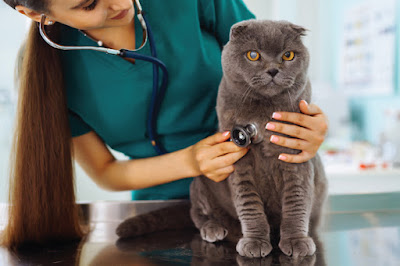Proper Food
Anyone who spends any amount of time in the gym will testify to the importance of a proper diet with high-quality foods. The same goes for your pet – to maintain your pet's physical health, it is important to provide them with a balanced diet comprised of high-quality ingredients. The key term to note here is 'balanced diet' since overfeeding will lead to obesity and only pose further problems. High-quality foods will contain proteins, fats, fibre, calcium, and carbohydrates in the right amounts to encourage a healthy growth rate, while low-quality foods will use fillers instead of quality ingredients. A planned diet will benefit your pet's respiratory, skeletal, cardiovascular, and digestive systems, while unplanned free feeding will be detrimental to them. If you’re unsure about how to draw up a new diet plan, consult your vet for a few tips on the same.
Recognize Distress
Provide Emotional and Mental Stimulation
A pet will be truly healthy when it is in a good state, both physically and mentally. While we pay attention to a pet’s physical needs, we often forget the mental enrichment. Keeping your pet engaged mentally will prevent boredom, restlessness, and the eventually destructive behaviour a pet may exhibit in the absence of such stimulation. Play dates, puzzle toys, and enrichment toys can all help, especially when supplemented by your daily walks outdoors. Remember, when a pet is bored, that energy will manifest itself as destructive behaviour like chewing, whining, or biting, so try to help them release their energy at such a time instead of scolding them. Affection is a far more powerful motivator than anger, so make sure you show your pet you adore them. shower them with hugs, kisses, cuddles, brushings, and belly rubs (for dogs). Training your pet has numerous benefits, one of which is reduced stress and anxiety levels, which can be beneficial if you embark on pet travel frequently.
Routine & Regular Exercise
Mind and body go hand in hand, so your pet’s enriched mind requires an equally capable body to truly flourish. Hiking, walking, running, and swimming are all brilliant ways to exercise your dog, while cats will benefit from cat toys that stimulate them indoors like puzzles. Alternatively, you could set up an obstacle course, teach your pet tricks, or hide treats instead of handing them out to make things more interesting for your pet. A quick ten-to-fifteen-minute game of fetch can work wonders for your pet’s physical and mental health. Since different species and breeds of pets require different levels of daily exercise, consult your vet before making any changes in routine.
Socialization
Vet Visits
To conclude, provided you feed your pet good quality foods, follow a balanced diet, stimulate them physically & mentally, and socialize them at the right time, you should have no issues maintaining your pet’s health. Do remember tovisit your vet regularly, as they can help you spot problems in advance, but other than that, you should be good to go.




